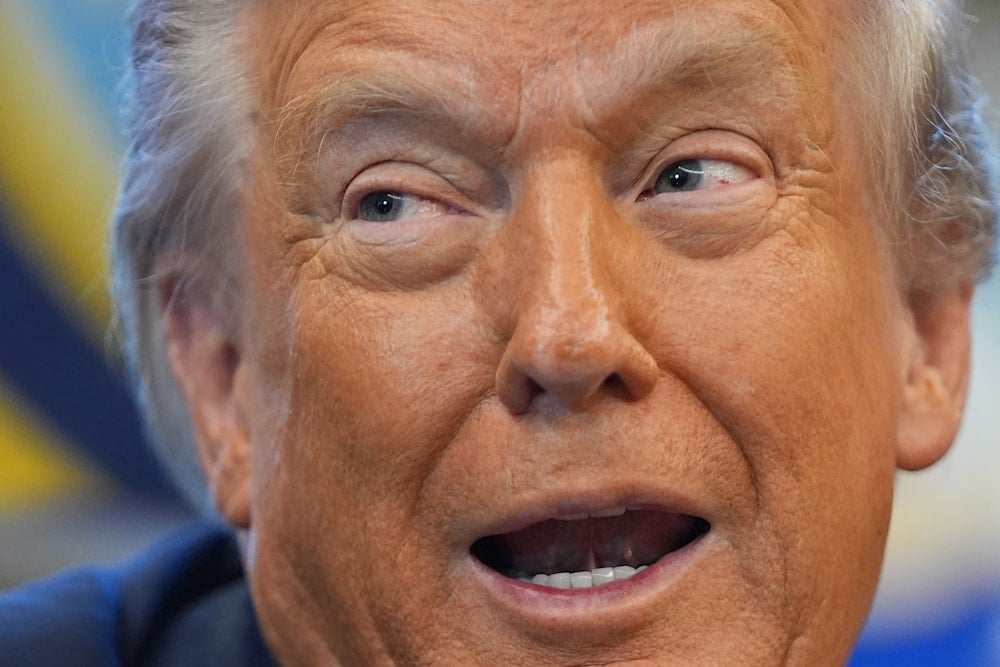Trump signs law to release Epstein files after months of evasion
Trump signs a law forcing the DOJ to release unclassified Jeffrey Epstein files after months of evading the issue, raising questions over exemptions and the scope of disclosures.
-

US President Donald Trump answers questions from reporters during a meeting with the White House task force on the 2026 FIFA World Cup in the Oval Office of the White House, on November 17, 2025, in Washington (AP)
US President Donald Trump signed into law on Wednesday the Epstein Files Transparency Act, a measure obligating the Department of Justice (DOJ) to release a wide range of unclassified documents tied to the investigation, prosecution, and death of convicted sex offender Jeffrey Epstein.
The move follows months of resistance from the White House and comes only after overwhelming bipartisan pressure in Congress.
Entangled?
The law mandates that the DOJ disclose all unclassified materials, including internal communications, investigative records, and documents related to Epstein’s 2019 death in federal custody, within 30 days. Trump, who could have unilaterally released many of the files without congressional action, had previously sought to slow-walk or sidestep the legislation.
Political opponents argue that Trump’s reluctance stemmed from fears of his own potential entanglement in Epstein’s criminal network, alleging that the disclosures could expose uncomfortable associations.
Congressional pressure forces a reversal
Trump’s shift came after the bill passed the House by a near-unanimous 427–1 vote and cleared the Senate by unanimous consent. The broad congressional support left the White House little room to maneuver. The president announced the signing in a brief online post, turning the moment into a partisan attack on Democrats.
“Perhaps the truth about these Democrats, and their associations with Jeffrey Epstein, will soon be revealed … I HAVE JUST SIGNED THE BILL TO RELEASE THE EPSTEIN FILES!” he wrote, attempting to frame the transparency measure as a blow to his political rivals.
What the law requires and what can still be withheld
While the act compels the DOJ to disclose extensive documentation, it includes several carve-outs that allow officials to withhold or redact specific categories of information. These include:
- Identities of victims and materials that could endanger their privacy or safety;
- Records whose release could jeopardize active investigations or prosecutions;
- Classified national security or foreign policy information.
Despite these exemptions, the law explicitly bars the government from withholding information solely due to the “embarrassment,” “reputational harm,” or “political sensitivity” of any individuals named in the records, a provision designed to prevent shielding public figures from scrutiny.
Attorney General Pam Bondi said the department would aim for “maximum transparency” while insisting that the protection of victims would remain a priority.
Read more: Trump slams Republicans over renewed Epstein accusations
Concerns over potential loopholes
Lawmakers and legal analysts caution that the DOJ could still legally delay or limit disclosures by citing ongoing investigations. This provision may serve as a broad loophole that allows officials to withhold sensitive documents or names under the pretext of protecting future legal action.
Some lawmakers have already signaled that congressional oversight will be necessary to ensure the DOJ does not circumvent the intent of the legislation. The central question now is whether the files will truly be made public, or whether the department will invoke the law’s exemptions to keep significant portions hidden.
Why the disclosure matters
For years, survivors of Epstein’s sex trafficking and their legal advocates have demanded full transparency about the financier’s vast network of associates, questioning how he operated with impunity for so long and why federal authorities failed to intervene sooner. The release of internal DOJ records could provide answers regarding prosecutorial decisions, Epstein’s plea deals, and the circumstances surrounding his death.
The political implications are also significant. Epstein’s social circle included powerful individuals across political, financial, and diplomatic sectors, and the release of detailed records may expose previously hidden connections. Trump’s decision to frame the bill as a tool against Democrats reflects the highly charged political environment surrounding the files.
Read more: Inside the Epstein-Rothschild web behind 'Israel’s' spy tech empire

 4 Min Read
4 Min Read










